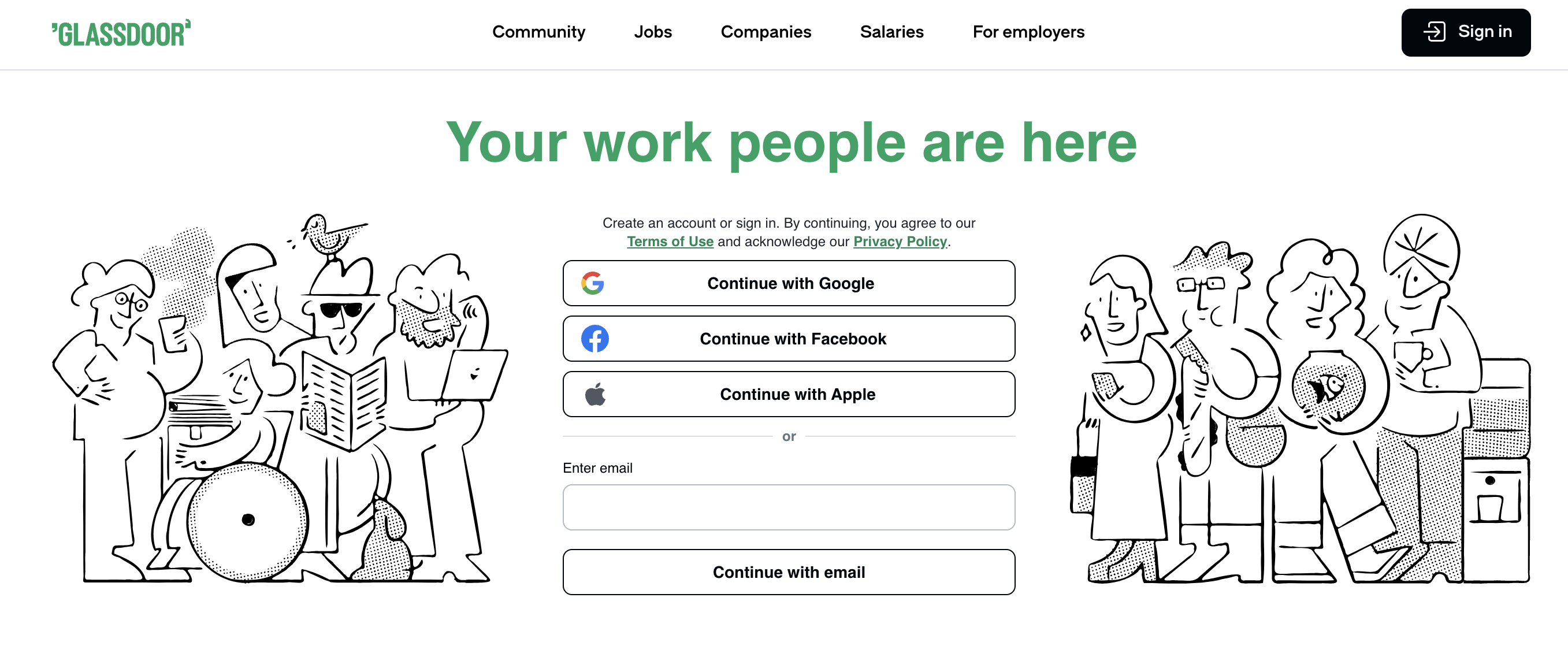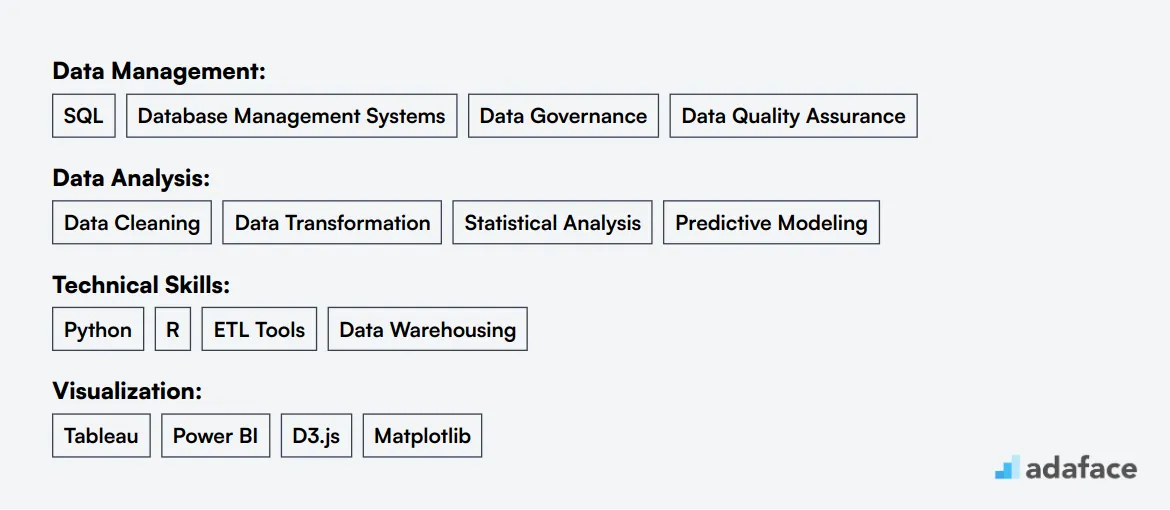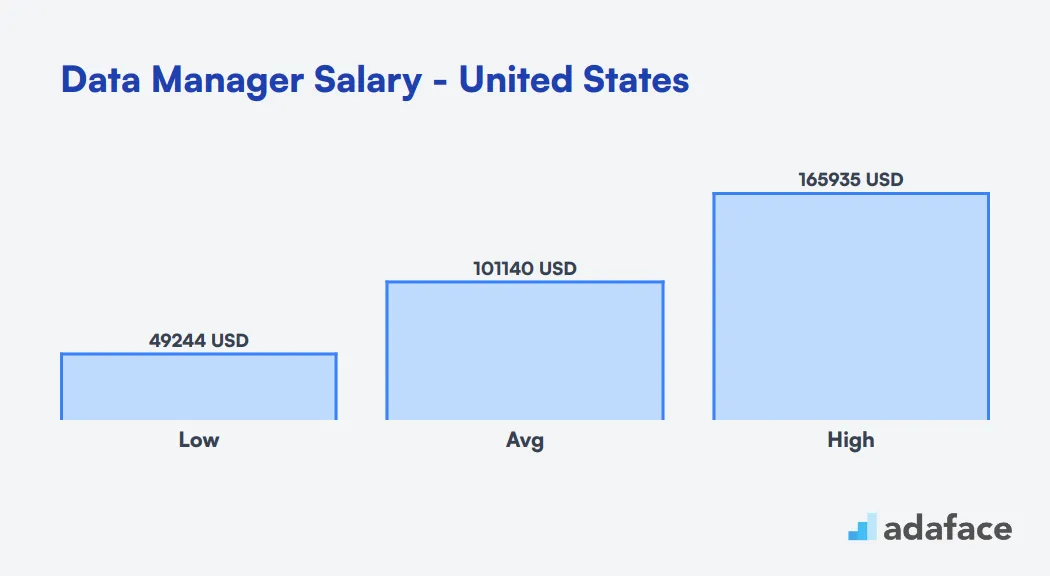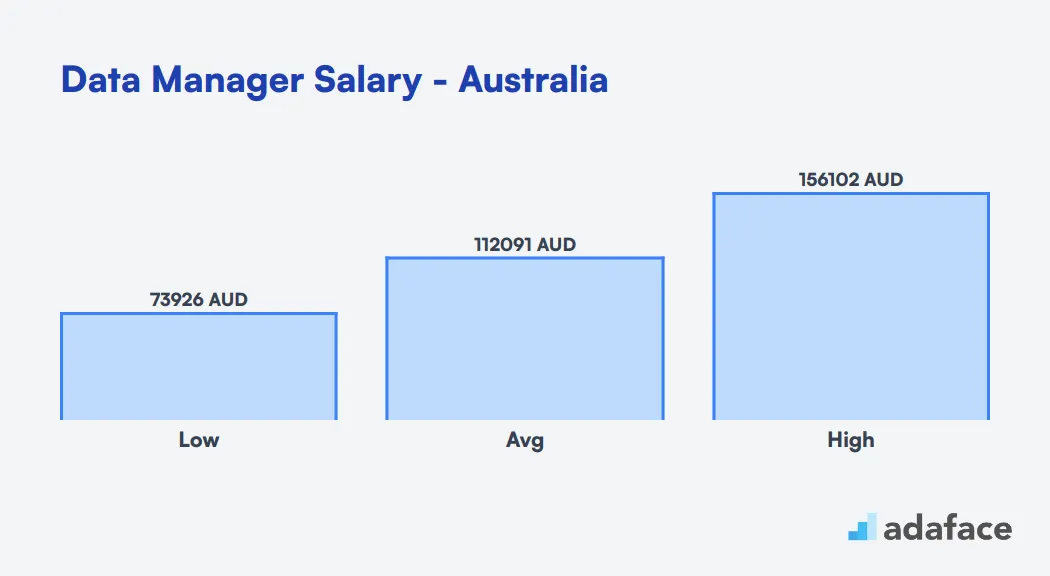Data Managers play a critical role in today's data-driven business landscape. They're responsible for overseeing an organization's data assets, ensuring data quality, and implementing effective data governance strategies. However, many companies struggle to find the right fit for this position, often underestimating the breadth of skills required or focusing too narrowly on technical expertise alone.
This comprehensive guide will walk you through the process of hiring a Data Manager, from understanding the role to conducting effective interviews. We'll cover the essential skills for Data Managers, how to craft an appealing job description, and where to find top talent in this competitive field.
Table of contents
What Does a Data Manager Do?
A Data Manager is responsible for overseeing an organization's data-related operations. They ensure data quality, security, and accessibility while developing strategies to maximize the value of data assets.
The day-to-day tasks of a Data Manager include:
- Designing and implementing data management policies
- Overseeing data storage, backup, and recovery processes
- Ensuring compliance with data protection regulations
- Collaborating with other departments to address data needs
- Managing data integration and migration projects
- Conducting data quality assessments and cleansing
- Training staff on data management best practices
Skills and qualifications to look for in a Data Manager
Creating an ideal candidate profile for a Data Manager role can be tricky. Recruiters often misjudge the balance between required and preferred qualifications. It's essential to distinguish between what's necessary for the role and what could enhance a candidate's value.
To build a solid candidate profile, consider these key skills and qualifications for a Data Manager. Below you'll find a table summarizing both the required and preferred skills, which can help streamline your hiring process.
| Required skills and qualifications | Preferred skills and qualifications |
|---|---|
| Bachelor's degree in Computer Science, Information Management or a related field | Master’s degree in Business Analytics, Data Science, or related field |
| Minimum of three years experience in data management or related roles | Experience with cloud-based data platforms such as AWS, Azure, or Google Cloud |
| Strong proficiency in SQL and database management systems | Familiarity with data visualization tools like Tableau or Power BI |
| Experience with data governance and data quality assurance practices | Knowledge of programming languages such as Python or R |
| Excellent analytical and problem-solving skills | Proven experience in project management or leadership roles |
How to Write an Effective Data Manager Job Description
Once you've defined the ideal candidate profile for your Data Manager role, the next step is crafting a compelling job description. A well-written JD attracts top talent and sets clear expectations. Here are some tips to help you create an impactful Data Manager job description:
- Highlight key responsibilities: Clearly outline the role's main duties, such as overseeing data storage, ensuring data quality, and implementing data governance policies.
- Balance technical and soft skills: List required technical skills like SQL and data modeling, but also emphasize soft skills such as leadership and communication.
- Showcase growth opportunities: Highlight potential career progression and ongoing learning opportunities to attract ambitious candidates.
- Include industry-specific requirements: Mention any sector-specific knowledge or certifications that would be valuable for the role.
Top Platforms to Hire Data Managers
Once you've crafted a detailed job description for a Data Manager, the next step is to list it on job posting sites to attract potential candidates. These platforms help you tap into a diverse talent pool, ensuring you have access to the right professionals for your needs.
LinkedIn Jobs
Great for hiring full-time Data Managers due to its extensive professional network and detailed job posting features.

Indeed
Useful for any type of hiring (full-time, part-time, freelance) due to its large reach and easy-to-use posting interface.

Glassdoor
Ideal for full-time roles with its in-depth company reviews and salary information, helping attract informed candidates.

In addition to the first three platforms, there are several other noteworthy options to explore. Upwork is ideal for hiring freelance Data Managers, offering global access and flexible options. For remote positions, FlexJobs and We Work Remotely are excellent choices, catering specifically to remote job seekers. AngelList is perfect for startups looking to hire data management talent within tech and innovative environments. If you're targeting tech-specific roles, Dice offers specialized job listings. Lastly, CareerBuilder and Monster are versatile platforms that support various hiring needs with their wide-ranging audience and resources. For a seamless hiring process, consider using an online assessment platform to evaluate candidates efficiently.
Keywords to Look for in Data Manager Resumes
Resume screening is a critical step in hiring Data Managers. It helps you quickly identify candidates with the right skills and experience before moving to interviews.

When manually screening resumes, focus on key technical skills like SQL, database management systems, and data governance. Look for experience with data quality assurance practices and analytical problem-solving abilities.
To streamline the process, consider using AI-powered tools or language models. These can help you quickly scan multiple resumes and highlight candidates who match your specific criteria.
Here's a sample prompt for AI-assisted resume screening:
TASK: Screen resumes for Data Manager role
INPUT: Resumes
OUTPUT:
- Candidate name and email
- Matching keywords
- Score (out of 10)
- Recommendation
- Shortlist (Yes/No/Maybe)
KEYWORDS:
- SQL and database management
- Data governance and quality assurance
- Analytics and problem-solving
- [Data visualization tools](https://www.adaface.com/assessment-test/data-visualization-test) (e.g., Tableau, Power BI)
- Programming languages (Python, R)
- Cloud platforms (AWS, Azure, Google Cloud)
Recommended skills tests for assessing Data Managers
Skills tests are an effective way to evaluate Data Manager candidates beyond their resumes. They provide objective insights into a candidate's abilities and readiness for the role. Here are five key tests we recommend for assessing Data Managers:
SQL Test: A SQL online test is essential for evaluating a Data Manager's ability to query and manipulate databases. This test assesses their proficiency in writing complex queries, managing data, and optimizing database performance.
Data Analysis Test: The Data Analysis test evaluates a candidate's ability to interpret and analyze complex datasets. It covers statistical analysis, data visualization, and drawing actionable insights from data.
Data Modeling Test: A Data Modeling test assesses the candidate's ability to design and implement efficient data structures. This skill is critical for organizing and managing large-scale data systems.
Business Intelligence Analyst Test: The Business Intelligence Analyst test evaluates a candidate's ability to transform raw data into meaningful business insights. It covers data warehousing, reporting tools, and strategic decision-making skills.
Data Warehouse Test: A Data Warehouse test assesses the candidate's knowledge of data warehouse concepts, ETL processes, and dimensional modeling. This is important for managing and optimizing large-scale data storage and retrieval systems.
Structuring Interviews for Hiring Data Managers
Once candidates pass the skills tests, it's time to move them to technical interviews where their hard skills are assessed. Skills tests are great for filtering out unfit candidates, but interviews help identify the best fit for the role. Understanding how candidates approach problem-solving and interact with data is key at this stage.
Here are some example interview questions to consider: What is your experience with data warehousing and how have you improved existing systems? This question helps gauge their practical knowledge and problem-solving abilities. Can you describe your approach to data modeling for a new project? This reveals their planning and analytical skills. How do you ensure data quality and integrity in your work? This tests their attention to detail. What are the key skills required for a data manager? Skills required for data manager can help guide this discussion. How do you handle stakeholder requirements and priorities? Finally, ask about their experience with data architecture to assess how they manage complex systems. These questions help understand a candidate's technical expertise and how they handle real-world challenges.
How much does it cost to hire a Data Manager?
The cost of hiring a Data Manager can vary widely based on location, experience, and industry. In the United States, the average salary for a Data Manager is around $101,141 per year. However, this figure can range from $49,245 to $165,935, depending on factors like expertise and geographical location.
It's important to note that salaries can differ significantly between cities. For example, a Data Manager in Santa Clara, CA might earn about $161,464, while one in Richmond, VA could expect around $88,019. In Australia, the average salary is approximately AUD 112,091, with a range from AUD 73,927 to AUD 156,103.
Data Manager Salary in the United States
In the United States, Data Manager salaries vary significantly based on location and experience. The average salary across the country is approximately $101,141 per year. Salaries can range from around $49,245 on the lower end to $165,935 at the higher end, depending on factors like expertise and region. For instance, in Santa Clara, CA, the median salary is notably higher, at about $161,464, compared to $88,019 in Richmond, VA.

Data Manager Salary in Australia
Data Managers in Australia can expect an average salary of around AUD 112,091. Salaries typically range from AUD 73,927 to AUD 156,103, depending on the location and level of expertise. Notably, Sydney offers some of the highest salaries, with a median of approximately AUD 144,404.

What's the difference between a Data Manager and a Database Administrator?
Many people often confuse Data Managers with Database Administrators, but these roles serve distinctly different purposes within an organization. While both deal with data, their roles, responsibilities, and focus areas are not the same.
A Data Manager is responsible for overseeing the entire data strategy and governance of an organization. They focus on aligning data initiatives with the overall business goals and often lead data teams. Their technical skills include data modeling, ETL processes, and analytics. Typically, Data Managers have a business or IT degree, often at the master's level, and possess certifications like CDMP or DGMP. Frequent interactions with stakeholders across departments are a regular part of their role.
On the other hand, a Database Administrator focuses on maintaining and optimizing specific database systems. Their expertise lies in technical areas like SQL, database security, and performance tuning. They usually hold degrees in Computer Science or IT and certifications such as Oracle DBA or Microsoft MCDBA. Their interaction is mainly limited to the IT department and they may lead smaller database teams. To further understand the skills required for these roles, exploring specific competencies can be beneficial.
| Data Manager | Database Administrator | |
|---|---|---|
| Primary Focus | Overall data strategy and governance | Database maintenance and optimization |
| Scope of Responsibility | Broader, organization-wide data management | Specific database systems |
| Technical Skills | Data modeling, ETL, analytics | SQL, database security, performance tuning |
| Business Acumen | High, aligns data with business goals | Moderate, focuses on technical aspects |
| Typical Education | Business or IT degree, often Masters | Computer Science or IT degree |
| Key Certifications | CDMP, DGMP | Oracle DBA, Microsoft MCDBA |
| Team Management | Often leads data teams | May lead database team |
| Stakeholder Interaction | Frequent, across departments | Limited, mainly IT department |
Hire the Right Data Managers for Your Needs
Throughout this blog post, we've explored various aspects of hiring a Data Manager, including understanding their role, recognizing the skills and qualifications needed, crafting effective job descriptions, and structuring interviews. We've also covered some platforms and strategies to streamline your hiring process.
One key takeaway is to focus on writing precise job descriptions and utilizing skills tests for accurate assessments. Implementing tests like data analysis can help ensure candidates possess the necessary capabilities. By doing so, you will improve your chances of hiring talented Data Managers who can meet your organization's needs.
Data Modeling Skills Test
FAQs
A Data Manager is responsible for overseeing data storage, security, and accessibility. They develop data policies, ensure data quality, manage databases, and collaborate with various departments to meet data-related needs.
You can assess technical skills through data modeling tests, SQL assessments, and practical exercises that simulate real-world data management scenarios.
Important non-technical skills for a Data Manager include strong communication, leadership, problem-solving, and project management abilities. They should also have a good understanding of business processes and data governance principles.
You can find qualified Data Manager candidates on professional networking sites like LinkedIn, specialized job boards for data professionals, data management conferences, and through referrals from current employees in data-related roles.
Structure the interview to assess both technical knowledge and soft skills. Include questions about past projects, problem-solving scenarios, and leadership experiences. Consider incorporating a practical component where candidates can demonstrate their data management skills.
Relevant certifications for Data Managers include Certified Data Management Professional (CDMP), IBM Certified Data Engineer, Microsoft Certified: Azure Data Engineer Associate, and Cloudera Certified Professional: Data Engineer.

40 min skill tests.
No trick questions.
Accurate shortlisting.
We make it easy for you to find the best candidates in your pipeline with a 40 min skills test.
Try for freeRelated posts
Free resources



